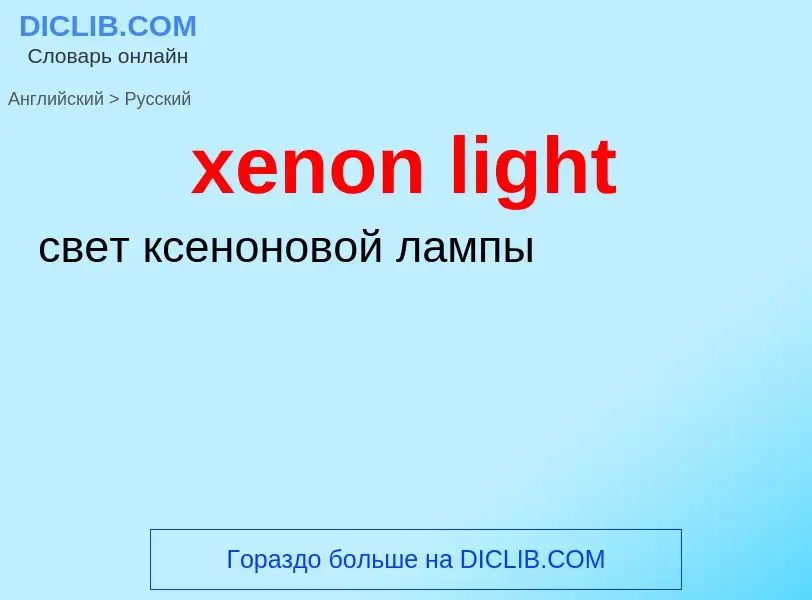Vertaling en analyse van woorden door kunstmatige intelligentie ChatGPT
Op deze pagina kunt u een gedetailleerde analyse krijgen van een woord of zin, geproduceerd met behulp van de beste kunstmatige intelligentietechnologie tot nu toe:
- hoe het woord wordt gebruikt
- gebruiksfrequentie
- het wordt vaker gebruikt in mondelinge of schriftelijke toespraken
- opties voor woordvertaling
- Gebruiksvoorbeelden (meerdere zinnen met vertaling)
- etymologie
xenon light - vertaling naar russisch
['zi:|nɔn'ze{nɔn}-]
общая лексика
ксенон
ксеноновый
существительное
химия
ксенон
Definitie
Wikipedia
Naturally occurring xenon (54Xe) consists of seven stable isotopes and two very long-lived isotopes. Double electron capture has been observed in 124Xe (half-life 1.8 ± 0.5(stat) ± 0.1(sys) ×1022 years) and double beta decay in 136Xe (half-life 2.165 ± 0.016(stat) ± 0.059(sys) ×1021 years), which are among the longest measured half-lives of all nuclides. The isotopes 126Xe and 134Xe are also predicted to undergo double beta decay, but this has never been observed in these isotopes, so they are considered to be stable. Beyond these stable forms, 32 artificial unstable isotopes and various isomers have been studied, the longest-lived of which is 127Xe with a half-life of 36.345 days. All other isotopes have half-lives less than 12 days, most less than 20 hours. The shortest-lived isotope, 108Xe, has a half-life of 58 μs, and is the heaviest known nuclide with equal numbers of protons and neutrons. Of known isomers, the longest-lived is 131mXe with a half-life of 11.934 days. 129Xe is produced by beta decay of 129I (half-life: 16 million years); 131mXe, 133Xe, 133mXe, and 135Xe are some of the fission products of both 235U and 239Pu, so are used as indicators of nuclear explosions.
The artificial isotope 135Xe is of considerable significance in the operation of nuclear fission reactors. 135Xe has a huge cross section for thermal neutrons, 2.65×106 barns, so it acts as a neutron absorber or "poison" that can slow or stop the chain reaction after a period of operation. This was discovered in the earliest nuclear reactors built by the American Manhattan Project for plutonium production. Because of this effect, designers must make provisions to increase the reactor's reactivity (the number of neutrons per fission that go on to fission other atoms of nuclear fuel) over the initial value needed to start the chain reaction. For the same reason, the fission products produced in a nuclear explosion and a power plant differ significantly as a large share of 135
Xe will absorb neutrons in a steady state reactor, while basically none of the 135
I will have had time to decay to Xenon before the explosion of the bomb removes it from the neutron radiation.
Relatively high concentrations of radioactive xenon isotopes are also found emanating from nuclear reactors due to the release of this fission gas from cracked fuel rods or fissioning of uranium in cooling water. The concentrations of these isotopes are still usually low compared to the naturally occurring radioactive noble gas 222Rn.
Because xenon is a tracer for two parent isotopes, Xe isotope ratios in meteorites are a powerful tool for studying the formation of the solar system. The I-Xe method of dating gives the time elapsed between nucleosynthesis and the condensation of a solid object from the solar nebula (xenon being a gas, only that part of it that formed after condensation will be present inside the object). Xenon isotopes are also a powerful tool for understanding terrestrial differentiation. Excess 129Xe found in carbon dioxide well gases from New Mexico was believed to be from the decay of mantle-derived gases soon after Earth's formation. It has been suggested that the isotopic composition of atmospheric xenon fluctuated prior to the GOE before stabilizing, perhaps as a result of the rise in atmospheric O2.





![animated version]]) animated version]])](https://commons.wikimedia.org/wiki/Special:FilePath/Xenon-flash.jpg?width=200)



